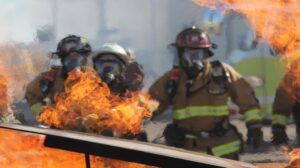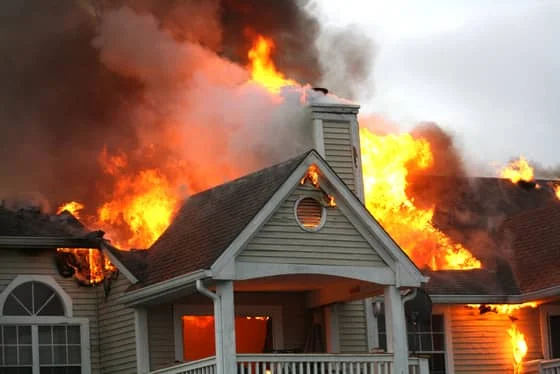In the US, fire departments respond to a call every 24 seconds – many of these calls are for house fires.
Hopefully, your home won’t cause a house fire. But if it does, or if you’re concerned about fire damage, here’s what you should know about insurance cover after house fire. Understanding your policy can offer peace of mind and financial protection, helping you prepare for unexpected events.

Homeowners Insurance and House Fires – What is Covered?
For instance, you may be wondering if homeowners insurance covers smoke and fire damage?
Yes, it does. A basic homeowners insurance policy includes coverage for both smoke and fire damage, emphasizing the importance of insurance cover after a house fire. Your insurance also covers smoke damage to your home from a neighbor’s fire, so the smoke doesn’t have to originate from within your home. Additionally, your homeowners insurance protects you from damage caused by wildfires. This comprehensive coverage ensures that in the event of a house fire, your policy provides the necessary financial protection to address both direct and indirect forms of damage.
Basic HO3 homeowners insurance, also known as dwelling coverage, protects against physical house damage. In addition, it also covers “other structures” on your property, like driveways, fences, sheds, and permanently affixed structures.
Does Homeowners Insurance Cover Personal Belongings?
The things you possess are referred to as personal property. Whether your belongings are at home or elsewhere, your household insurance has your back, especially with insurance cover after house fire. As a result, you’re protected if your shed, containing several power tools, burns down, ensuring coverage extends to such events.
This aspect of your policy plays a crucial role in providing financial security and peace of mind in times of loss.
Please be aware that certain precious items, like as jewelry and works of art, may be subject to sub-limits so when purchasing your policy be sure to add additional coverage for these items if needed.
Does Homeowners Insurance Cover Living Costs?
If your home is rendered uninhabitable by fire or smoke, you may be covered under a provision known as “loss of use,” in which case your insurance provider may contribute to the cost of a temporary residence as well as essential living expenses like food, laundry, parking, etc.
Does Homeowners Insurance Cover Personal Liability?
Basic homeowners insurance typically includes coverage for Personal liability incidents. Your insurance provider may cover injuries on your property due to your fault or if you or anyone on your policy damages another’s property.
For instance, if a visitor injures their wrist while escaping a fire in your home, they may have medical bills to cover. Your medical expense coverage could help with those costs.
When Would Fire Damage Not be Covered by Homeowners Insurance?
The main reason for insurance not covering a house fire is if you or anybody else listed on your insurance policy purposefully started the fire.
You should also be aware of the distinction between identified and open risks. The structure of your home and any attached structures are covered for all types of damage under a HO3 policy’s “open perils” coverage (dwelling coverage), with the exception of the exclusions specifically mentioned in the policy.
These named perils in your policy can include such things as explosions, vandalism, lightning, riots, and more.
How to File an Insurance Claim
Here are some tips for navigating the claims process:
It is often helpful to have pictures or videos of the damage if you need to file an insurance claim for fire damage, highlighting the importance of insurance cover after house fire. Insurance companies frequently utilize photos and videos to determine the need for an investigator or restoration vendor for claims. This documentation is vital for efficient claim processing, highlighting the importance of comprehensive insurance after a house fire.
Please note: you should not entire a fire site to take videos and photos until the fire department has issued an “all clear” announcement.
Here is one more important tip: after a fire forces you to leave your house, be sure to save your receipts for any out-of-pocket emergency charges.
Is it Safe to Occupy a Smoke-Damaged Home?
Immediately after a fire, call emergency services. Then, contact your insurance provider once you extinguish the fire and it’s safe to enter.
While assessing the damage, they will evaluate the situation and decide if you need interim housing.
Remember that loss of use provision from your homeowners insurance that we mentioned earlier?
This is where that provision could kick in and cover additional expenses you incur while your house is unusable.
At this time, you’ll also need to find a dependable cleanup business that specializes in fire damage.
Search for local businesses with high customer satisfaction ratings on review websites like Google, Yelp, Angie’s List, or the Better Business Bureau website.
These firms are experts at going in after a fire and cleaning and restoring textiles, clothing, electronics, furniture, and other goods so that the home is once again safe to live in.
However, keep in mind that returning home is not necessarily safe just because the fire is out and you have permission.
Smoke and soot can cling to walls, furniture, and floors, emitting unpleasant odors and potentially harming your eyes and lungs.
Smoke, soot, and fires can also impact your overall health by producing toxic substances.
For example, fibers breathed in from the fire can attach themselves in the lungs and can cause mesothelioma, an aggressive form of cancer with persistent and frequently fatal symptoms.
What Can I Do to Repair Fire Damage?
Don’t handle the major damage by yourself. Make contact with a reputable restoration business for assistance. If the restoration process may seem too overwhelming for you, can always turn to real estate agents to help sell a fire-damaged house.
They’ll evaluate the structural integrity of your house and the extent of the fire damage.
If the fire resulted in a burst pipe, they might also hire a company to clean up water damage.
After the restoration business approves, you can follow the Red Cross’s instructions to clean light water damage, ensuring compliance with your insurance after a house fire. However, make sure to confirm with them that it’s okay to handle simple damage on your own. This approach ensures your actions comply with your insurance policy terms and do not inadvertently impact the coverage or claims process after a house fire.
How Much Does Fixing or Repairing Fire Damage Cost?
The cost of fixing fire damage is based on how much damage there is and for typical home fires can range from $3,000 to approximately $30,000 with the average cost being around $14,000. Given the significant cost of repair, it may sometimes be more financially sensible to sell a fire-damaged house instead of undertaking costly repairs, especially if the damage is extensive.
The state in which you live and the severity of the fire damage will have a significant impact on the average cost of your clean up.
Want to Sell Your Fire-Damaged House?
We Buy Fire Damaged Houses pays all cash and buys homes in as-is condition so you do not have to go through a stressful repair process.
Fill out the form below to see if your burned home qualifies for a free quote.

